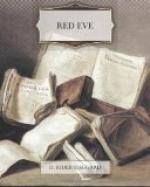Hugh hid his face in his hands and sobbed in his helpless rage.
“The innocent slain,” he said, “by me, and the guilty spared—by me. Oh, God! my cup is full. Take his arms, man, that one day I may show them to Acour, and let us be going ere we share this poor knight’s fate. Ah! who could have guessed it was thus that I and Sir Pierre should meet and part again.”
CHAPTER X
THE KING’S CHAMPION
Back over that fearful field, whereof the silence was broken only by the groans of the wounded and the dying, walked Hugh and Grey Dick. They came to the great rampart of dead men and horses that surrounded the English line, and climbed it as though it were a wall. On the further side bonfires had been lit to lighten the darkness, and by the flare of them they saw Edward of England embracing and blessing his son, the Black Prince, who, unhelmeted, bowed low before him in his bloodstained mail.
“Who were they besides, Sir Robert Fitzsimmon and Richard de Beaumont who helped you when you were down, my son?” asked the King.
The Prince looked about him.
“I know not, Sire. Many, but here is one of them,” and he pointed to Hugh, who just then appeared within the circle of the firelight. “I think that he slew the Count Louis of Flanders.”
“Ah!” said the King, “our young merchant of Dunwich—a gallant man. Kneel you down, merchant of Dunwich.”
Hugh knelt, and the King, taking the red sword from his hand, struck him with it on the shoulder, saying:
“Rise, Sir Hugh de Cressi, for now I give you that boon which your deathfaced servant asked before the battle. You have served us, or rather England well, both of you. But whose armour is that the archer carries, Sir Hugh?”
“Sir Edmund Acour’s, lord de Noyon, Sire, only, alack! another man was within the armour.”
“Your meaning?” said the King briefly, and in few words Hugh told the tale.
“A strange story, Sir Hugh. It would seem that God fought against you in this matter. Also I am wroth; my orders were that none of my men should sally out, though I fear me that you are not the only one who has broken them, and for your great deeds I forgive you.”
“Sire,” said Hugh, dropping to his knee again, “a boon. This de Noyon, your enemy and mine, has cheated and mocked me. Grant to me and my servant, Richard the archer, permission to follow after him and be avenged upon him.”
“What is this you ask, Sir Hugh? That you and your brave henchman should wander off into the depths of France, there to perish in a dungeon or be hanged like felons? Nay, nay, we need good men and have none to spare for private quarrels. As for this traitor, de Noyon, and his plot, that egg is broken ere it was hatched, and we fear him no more. You follow me, Sir Hugh, and your servant with you, whom we make a captain of our archers.




